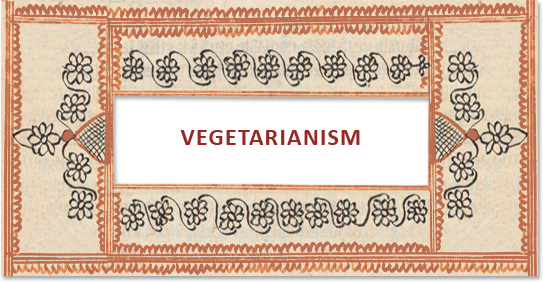


By : Arjan Varsani
Son : But what about eggs? They do not involve killing!
Some vegetarians include eggs in their diet because they do not involve killing (eggs produced by battery hens are unfertilized). But I cannot imagine how anyone can eat eggs once they know that these unfertilized eggs are in fact the product of a hen’s menstrual cycle.
The Vegetarian Society (UK) advises their members to avoid battery eggs and only use free range eggs. This is because eggs produced by battery hens involve cruelty (5 hens are kept in a cage 20 inch wide throughout the duration of their lives). But free range eggs pose another serious question. If a cock is left roaming around with the hens, there is a chance that some of these eggs may be fertilized!
Son : But meat might taste good!
If someone liked the taste of roast leg of a human would that entitle him to kill you?
Why do so may meat-eaters dismiss the idea of eating cats, dogs, snakes and frogs’ legs as disgusting foreign habits? They may actually taste good!
Son : But what about plants? They have life too!
Is it OK to kill animals just because there is a possibility that plants may have feelings?
Should you take cocaine just because you know that by taking aspirins, you are already taking a drug?
Vegetarians realize that it is not possible to avoid all cruelty, they just try to minimize it.
Son : But it’s natural to eat meat! Don’t animals eat other animals?
Dad : Humans cannot be compared to animals in this way. Animals act only on instinct whereas humans have the ability to know between right and wrong.
Also, humans are not designed to eat meat. Human teeth, like those of herbivorous creatures, are designed for grinding and chewing vegetable matter. Humans lack in the sharp front teeth for tearing meat, that is characteristic of carnivores. Meat-eating animals, generally swallow their food without chewing it and therefore do not require molars or a jaw capable of moving sideways.
Once within the stomach, meat requires digestive juices high in hydrochloric acid. The stomachs of humans and herbivores produce acid less than one-twentieth the strength of that found in carnivores.
Another crucial difference between the meat-eater and the vegetarian is found in the intestinal tract, where food is further digested and nutrients are passed into the blood. A piece of meat is just part of a carcass, and its putrefaction creates poisonous wastes within the body. Therefore meat must be quickly eliminated. For this reason, carnivores possess alimentary canals only three times the length of their bodies. Since humans, like other non-meat-eating animals, have an alimentary canal eight times the body length, rapidly decaying meat is retained for a much longer time, producing a number of undesirable toxic effects.
Some meat-eaters will still continue to eat meat, fish and eggs, despite agreeing with the arguments I have put forward. Some will demand scientific proof that animals have feelings, these people should see what happens the next time they accidentally step on a dogs’ tail! Others will simply ignore the arguments.
We can only hope that most will see the sense in switching over to a vegetarian diet.